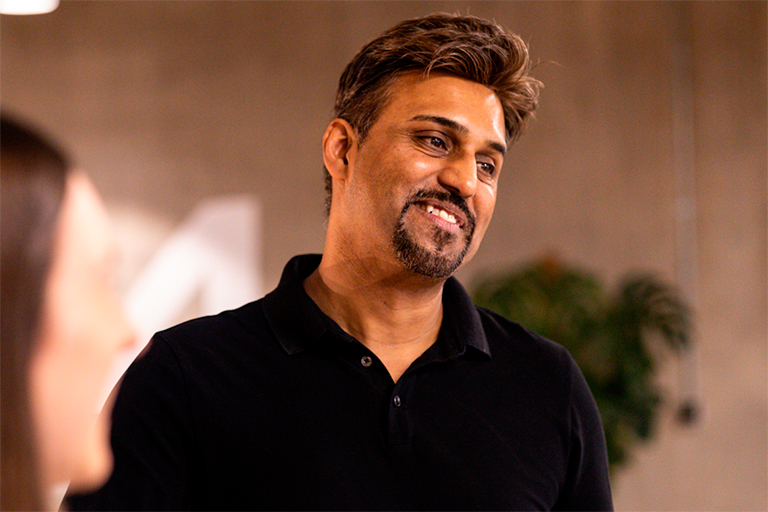Manoj thrives as a neurodivergent colleague


“Found out I’m autistic at 50,” says Manoj who reflects on the ways in which his manager helped him make small changes to the way he worked to fulfil his potential.
It’s taken half a century for Manoj Masuria to discover he is autistic. Now, with the support of his manager at Santander UK, he is on a mission to help others improve their understanding of the different ways a person’s brain processes information.
Manoj, or Mani as he is better known, is an Anti-Financial Crime Academy Learning and Development Manager, who previously unwittingly changed his behaviour to blend into social situations. This is known as “masking” – but now he can finally be himself.
During this year’s Neurodiversity Celebration Week (18th-24th March), Mani is sharing his story at Santander UK to highlight how embracing his autistic characteristics and the support of Aiden Dye, Senior Learning Manager helped him thrive.
Santander prides itself on its inclusive culture across the group and has developed a comprehensive guide on supporting colleagues who are neurodivergent (a term that describes people whose brain differences affect how they work and react).
For example, it has made slight adjustments to its assessment process to make it more inclusive.

A shock but help was at hand
Mani was supporting his mother with her late autism diagnosis when he started to question his own behaviour. “I noticed similar traits in me and thought I was bouncing off my mum,” he recalls. “I couldn’t express myself because I couldn’t understand what I was going through.”
After one of his regular one-to-one sessions with Aiden he logged on to the Help@hand app, an employee benefit digital health service, and was recommended to see his doctor about an autism diagnosis.
“It was a shock but Aiden was a really good ally and told me to embrace change and said I’d be supported,” says Mani. “I had a negative viewpoint of autism or someone who’s not neurotypical (a term that describes a person whose brain functions are considered usual or expected by society). When I went to therapy, I learned about the masking trait and I realised this is what I do.”
Unlocking potential
Aiden recalls the importance of Mani’s autism diagnosis: “It made a lot of sense to both of us. What we thought were gaps in his development were caused by him being neurodivergent.”
“Mani explained that if someone was walking past us, he couldn’t concentrate on what I was saying because he’d be drawn to them. I was experiencing that situation in a very different way – my focus wasn’t interrupted. There were lots of things like that which we started to explore and helped me better understand.”
By creating an environment where Mani felt he could be himself, Aiden also unlocked his potential. “Mani is brilliantly skilled at several things and now we allocate those to him,” says Aiden.
“There is a lot to celebrate about neurodiversity – there’s excellence and capability and we’ve enjoyed learning about it.”
Small changes, big results
Mani has applied ‘reasonable adjustments’ to enable him to work in the most productive way.
For example, he needs focus time, so he blocks out his diary and removes all push notifications. If something is urgent, Aiden will call his mobile.
Mani finds wearing noise cancelling headphones quietens his environment. He is hypersensitive to light, so he uses the ‘dark mode’ on his computer tools.
At Santander, we work to consider everyone’s needs, from the employee policies we write, to the products we introduce or the apps we develop for customers. By finding solutions to support neurodivergent people we are accommodating needs, easing discomfort and increasing opportunities both for employees and our customers.
Some 15 to 20% of the population is considered neurodivergent, according to various experts studies, and we are committed embracing neurological differences between people and encourage all our employees to express themselves.
Mani is working with Santander’s employee-led Enable! Network to deliver training sessions on neurodiversity to some of our suppliers.
“Everyone’s needs are different,” he says. “There is no one-size-fits-all solution, but you can give people a choice so those who are neurodivergent can control the things that they find a challenge."
“It’s important to remember that just because we like something a certain way, it doesn’t mean others will. We need to be tolerant of differences.”

Santander, the place to be yourself
Diversity, Equity and Inclusion, enablers of our cultural transformation






